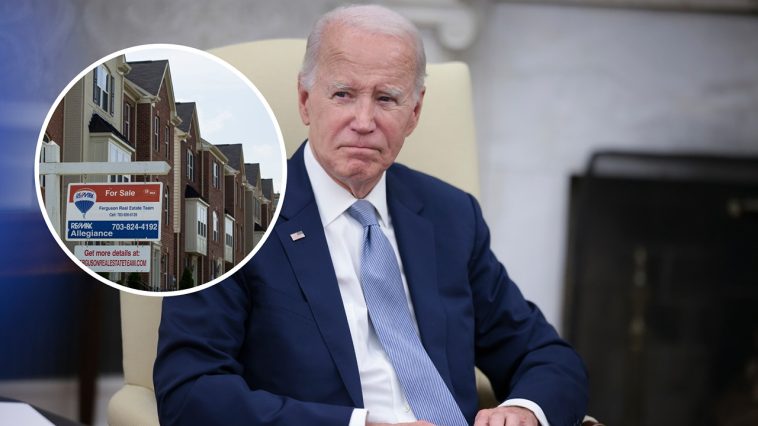LISTEN HERE:
Recent findings have highlighted a pressing issue facing almost half of all American renters: affordability. These findings stem from a study by the illustrious Joint Center for Housing Studies of Harvard University, which brought to light an unsettling reality in 2022.
Amid continually rising rent costs throughout the COVID-19 crisis, a startling 50% of U.S. renters coughed up more than 30% of their earnings on rent and utilities, as pointed out by NPR. Compounding this, almost half of this group were subjected to the distress of spending over 50% of their income on their living costs.
This situation presents an unexpected reality. Affordability challenges have ballooned across every single income bracket monitored, according to the lead author of the report, Whitney Airgood-Obrycki, a top-notch research associate with the center.
Notably, those households pulling in between $30,000 and $74,999 per year experienced the steepest climb in unaffordability since 2019. From the workforce, a staggering one-third of full-time renters found housing costs to be a heavy burden, as evidenced by the report.
An existing pinch-point was found amongst renters with annual earnings below $30,000, whose struggles with housing affordability were already acute. Counter to Airgood-Obrycki’s expectations, these strains escalated further with burdensome housing costs affecting a record 83% of this group. Suffice to say, the residual amount left over for other household expenses has experienced a drastic fall, plummeting almost by half, to a mere $310 per month as per NPR, citing the study’s findings.
The multifaceted issue goes beyond the mere affordability of rent. Renters are becoming increasingly engaged in difficult trade-offs just for securing affordable housing, as observed since the current administration took up office, as Airgood-Obrycki pointed out. Relocating to less desirable neighborhoods, longer commute times, and even compromising on vitally important factors like the quality of local schooling have unfortunately become common practices.
Even with these painful compromises, many still end up doling out more than they ought to on housing. This scenario is set against the backdrop of heightened rents and general inflation—two realities that continue to persist under the current administration, which also oversaw a record surge in homelessness in the previous year. While rent increases of previous years appear to be easing up in some areas, sadly, for numerous people, prices still remain higher than pre-pandemic levels.
Even though there is a record amount of new apartment construction, and a likely future softening of tight vacancy rates, this doesn’t necessarily translate to affordable housing availability for all. Those following the construction boom would note that many of these new constructions cater to the high-end market, due to increasing construction costs and high demand from wealthier renters, as reported by Airgood-Obrycki.
Indeed, over the last decade, the majority of new apartments have commanded a price tag of $1,400 per month or more. These prices, as per the researcher’s analysis, are simply not feasible for most renters. Thus, the current building boom may not dramatically shift the housing affordability landscape in the immediate future.
Apart from the escalating rent issue, Americans have also had the misfortune of dealing with a general increase in the cost of necessities—food, fuel, even mortgages—under the auspices of the current administration. As such, perceptions of these issues among voters could significantly influence the upcoming political landscape.
Looking ahead to the future of politics, the outcomes of the recent New Hampshire primary could paint an insightful picture. Voter exit poll data reveals a few areas of concern at the forefront of voters’ minds—ones that could pose challenges for the current administration and its party as they prepare for November’s races.
Where the administration’s campaign appears to have taken a stance around abortion rights and is building narratives around the potential ‘end of democracy’ under a potential second Trump presidency, the real issues at the heart of voters’ concerns run much deeper. This is all talk and no substance in the face of what matters most to voters, with scant backing according to the CBS News exit polls.
Interestingly, the most pressing concerns consistently highlighted by New Hampshire primary voters are the mounting illegal immigration crisis along the country’s southern border and the state of the economy. These issues were also prevalent among Iowa GOP caucus-goers, indicative of a national trend that could influence the upcoming electoral decision.
Interestingly, immigration is of particular importance to Trump supporters, turning it into a potentially decisive factor. The complexity of these concerns underscores the range of issues that voters are thinking about, bringing into question whether the administration’s current rhetoric is fully addressing the spectrum of voter interests.
As per The Messenger’s coverage of CBS’s top-of-mind concerns for primary voters, Trump now possesses a noteworthy seven-point lead over the incumbent in the current survey. If these trends continue, they could result in drastic shifts in the political landscape, unveiling the full extent of the American public’s sentiments under the current administration.
The review and reflection of these issues serve to highlight the mounting challenges faced by U.S. renters. With renters’ affordability burdens reaching new heights and the population’s most pressing concerns being the economy and border control, there is a clear disconnect between these realities and the current administration’s narrative.
The challenge will be for the current administration and its party – can they redefine their campaign strategies in order to engage voters and address these pressing issues? As voters consider rent, the economy, and immigration as the crux of their concerns, the administration’s success may hinge on their ability to respond effectively to these public sentiments.
In light of these findings, there is a significant amount of work to be done. Policymakers will need to better engage with and address these challenges that seem to resonate most deeply with voters. Failing to do so may prove detrimental at the polls in November, urging an urgent need for re-evaluating and realigning strategies.
Article: Real News Now


